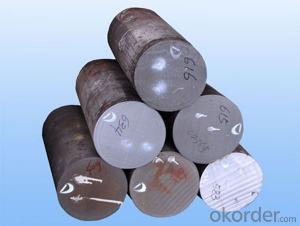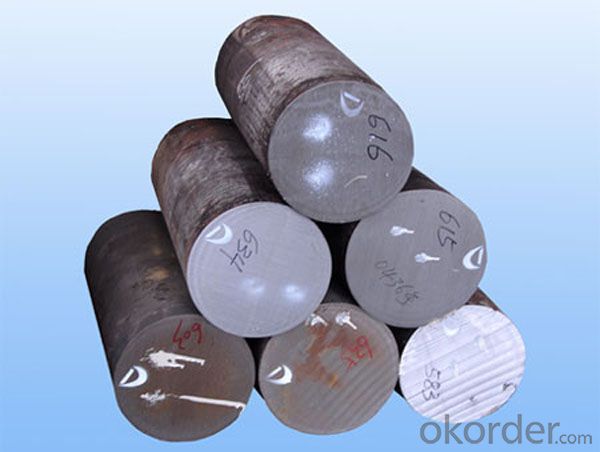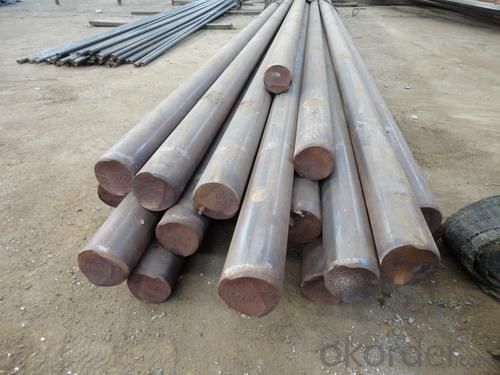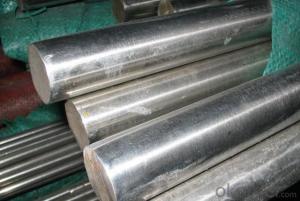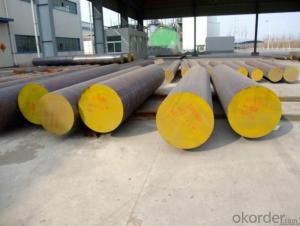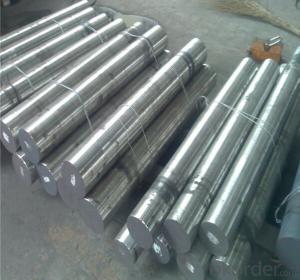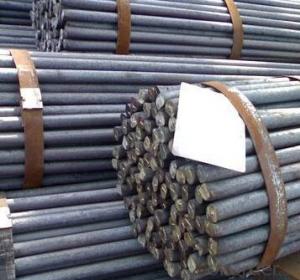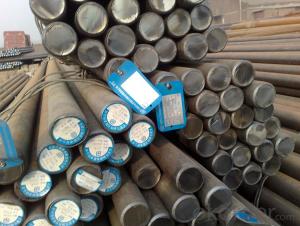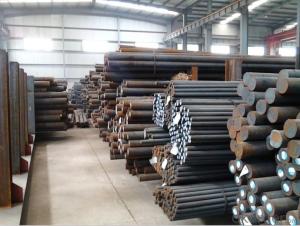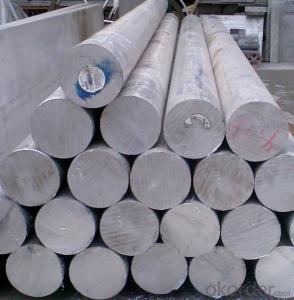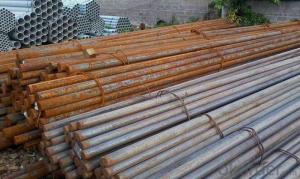Special Steel Cold Working Mould Steel 2140
- Loading Port:
- China main port
- Payment Terms:
- TT OR LC
- Min Order Qty:
- 25 m.t.
- Supply Capability:
- 10000 m.t./month
OKorder Service Pledge
OKorder Financial Service
You Might Also Like
Specification
Chemical Composition%(GB)
| C | Si | Mn | Cr | Mo | P | S |
| 0.90-1.05 | ≤0.40 | 0.80-1.10 | 0.90-1.20 | 1.20-1.60 | ≤0.030 | ≤0.030 |
Available Size
| Rolled round bar | φ65-120mm × L |
| Forged round bar | φ130-290mm × L |
Heat Treatment
| Item | Temperature ℃ | Hardness |
| Anneal | 770-790 | 207-255HB |
| Quenching | 820-840 | 62-65HRC |
| Tempering | 200-280 | 55-62HRC |
Applications:
| Can be used in the manufacture of cold punching, high precision punching die of cold extrusion mould and complicated shape, etc | ||||
| Can be used to make small deformation, long and complicated shape of cutting tool, such as long long broach, tap, reamer, milling cutter, the gauge |
Product show:

Workshop show:

FAQ:
1, Your advantages?
professional products inquiry, products knowledge train (for agents), smooth goods delivery, excellent customer solution proposale
2, Test & Certificate?
SGS test is available, customer inspection before shipping is welcome, third party inspection is no problem
3, Payment Terms?
30% TT as deposit and 70% before delivery.
Irrevocable L/C at sight.
4, Trading Terms?
EXW, FOB, CIF, FFR, CNF
5, After-sale Service?
We provides the services and support you need for every step of our cooperation. We're the business partner you can trust.
For any problem, please kindly contact us at any your convenient time.
We'll reply you in our first priority within 24 hours.
- Q: What are the properties of carbon steel?
- Carbon steel is a type of steel that primarily consists of iron and carbon. It is known for its high strength, durability, and relatively low cost compared to other materials. Carbon steel is also highly resistant to corrosion and can withstand high temperatures. It can be easily shaped and welded, making it a versatile material for various applications in industries such as construction, automotive, and manufacturing.
- Q: What grade of iron powder should be used for processing special steel? Are there any other elements on the request? How much are they?
- Special steel into high quality carbon steel, alloy steel, high alloy steel (alloy element is greater than 10%) three categories, including alloy steel and high alloy steel special steel production accounted for 70%.
- Q: What are the main alloying elements in special steel?
- The main alloying elements in special steel can vary depending on the specific type or grade of steel. However, some common alloying elements found in special steel include chromium, nickel, molybdenum, vanadium, tungsten, and cobalt. These alloying elements are added to steel to enhance its properties such as corrosion resistance, strength, hardness, and heat resistance. Each alloying element has its own unique effect on the steel, allowing for the creation of specialized steel grades for various applications in industries such as aerospace, automotive, oil and gas, and construction.
- Q: What are the different types of heat treatment processes used for special steel?
- There are several different types of heat treatment processes used for special steel, including annealing, normalizing, quenching, tempering, and precipitation hardening.
- Q: How does special steel perform in high-vibration environments?
- Special steel is specifically designed to perform well in high-vibration environments. Its unique composition and properties allow it to withstand and absorb vibrations, reducing the risk of structural damage, fatigue, and failure. Special steel's high strength, durability, and resistance to corrosion make it an ideal choice for applications where vibrations are a concern, ensuring reliable and long-lasting performance.
- Q: What are the main characteristics of spring steel?
- Spring steel is a type of high-carbon steel that is specifically designed to possess excellent elasticity and resilience. It is primarily known for its ability to return to its original shape after being bent or deformed, making it ideal for applications where repeated and controlled deflection is required. The main characteristics of spring steel include: 1. High Yield Strength: Spring steel is characterized by its high yield strength, which refers to the amount of stress it can withstand before permanent deformation occurs. This allows it to bear heavy loads and resist bending or breaking under pressure. 2. Excellent Elasticity: One of the most significant characteristics of spring steel is its exceptional elasticity. It can be flexed, twisted, or stretched without permanently deforming, and once the force is released, it returns to its original shape. This property is crucial for applications requiring constant and repetitive motion. 3. Superior Fatigue Resistance: Spring steel is exceptionally resistant to fatigue, meaning it can endure millions of cycles of stress without failing. This characteristic is crucial for products subjected to continuous and repetitive loads, such as springs in automotive suspensions or industrial machinery. 4. Good Hardness and Wear Resistance: Spring steel is typically hardened to enhance its wear resistance. This allows it to withstand abrasion and deformation under harsh conditions, making it suitable for applications that involve friction or impact, such as cutting tools or automotive components. 5. Excellent Formability: Spring steel can be easily formed into various shapes and sizes, making it highly versatile for different applications. It can be cold-drawn, rolled, or heat-treated to achieve specific mechanical properties, allowing manufacturers to customize its characteristics based on their specific requirements. Overall, the main characteristics of spring steel are its high yield strength, excellent elasticity, superior fatigue resistance, good hardness and wear resistance, and exceptional formability. These qualities make it a vital material in a wide range of industries, including automotive, aerospace, construction, and manufacturing.
- Q: Can special steel be used for food processing equipment?
- Yes, special steel can be used for food processing equipment. Special steel, often referred to as stainless steel, is commonly used in the food industry due to its corrosion resistance, durability, and hygienic properties. It is non-reactive and does not leach any harmful substances into the food, making it a safe and reliable choice for various food processing applications.
- Q: How does special steel perform in magnetic applications?
- Special steel, also known as stainless steel, generally performs well in magnetic applications. However, it is important to note that not all types of stainless steel are magnetic. The magnetic properties of special steel depend on its composition and the presence of certain elements such as nickel, manganese, and chromium. Austenitic stainless steel, which is the most common type, is non-magnetic due to its high nickel content. This makes it ideal for applications where magnetic interference is undesirable, such as in sensitive electronic devices or medical equipment. On the other hand, ferritic and martensitic stainless steels, which have lower nickel content, are magnetic. These types of special steel are commonly used in applications where magnetic properties are required, such as in magnetic separators, transformers, and electric motors. It is worth mentioning that the magnetic strength of stainless steel is relatively weak compared to other magnetic materials like iron or nickel. Therefore, if a strong magnetic field is needed, alternative materials may be more suitable. Overall, special steel can perform well in magnetic applications depending on the specific type and composition. It is important to consider the desired magnetic properties and consult with experts or refer to material specifications to ensure the appropriate selection for a particular application.
- Q: Can special steel be used in the power generation industry?
- Yes, special steel can be used in the power generation industry. Special steel alloys are often used for critical applications such as turbine blades, rotors, and other components in power plants. These steels possess high strength, resistance to corrosion, and heat resistance, making them suitable for the harsh operating conditions and high temperatures found in power generation equipment.
- Q: How does special steel perform in terms of wear resistance?
- Special steel is known for its exceptional wear resistance. Due to its unique composition and heat treatment, it exhibits a higher level of hardness and toughness compared to regular steel. This enables it to withstand abrasion, impact, and other forms of wear, making it highly suitable for applications where durability and longevity are crucial, such as in industrial machinery, cutting tools, and automotive components.
Send your message to us
Special Steel Cold Working Mould Steel 2140
- Loading Port:
- China main port
- Payment Terms:
- TT OR LC
- Min Order Qty:
- 25 m.t.
- Supply Capability:
- 10000 m.t./month
OKorder Service Pledge
OKorder Financial Service
Similar products
Hot products
Hot Searches
Related keywords
